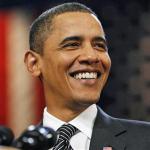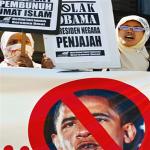15 March 2010

Photo: AP
US President Barack Obama (File photo)
U.S. President Barack Obama's visit to Indonesia and Australia has been postponed a few days. But it is still generating excitement, particularly in Indonesia. Many Indonesians see the U.S. president as a native son because his mother married an Indonesian and because he lived in Jakarta as young boy. Indonesian officials and supporters hope that Mr. Obama's upcoming state visit will translate the president's personal popularity into improved diplomatic relations.
At the Besuki Public School in Jakarta, eight year old student Chavielda Najma and classmates are rehearsing a dance number they hope to perform for the school's most famous alumni.
She says she likes President Obama very much because he was very good in social sciences.
She, like many Indonesians, feels a personal connection with the U.S. president because he spent part of his childhood years living in Jakarta and attending this school. There is even a statue of him at the entrance to the school. The statue was originally erected at a nearby park but was moved when some people complained that an Indonesian hero should be honored there instead.
Still, political analyst Wimar Witoelar says President Obama is quite popular in Indonesia because most people believe the president understands Indonesian culture and values. "We have a predominately Muslim population and we like to think of ourselves as going on the pluralistic road and he readily accepts and understands that. We don't have to explain that we are Muslims yet not terrorists," he said. "He understands exactly that concept."
Some of Mr. Obama's friends and supporters, like his retired former teacher Effendi, hope this mutual affection will translate into closer ties between the two countries.
He says he would tell the president to not forget Indonesia and make relations with the United States better and better.
With the peaceful re-election last June of President Susilo Bambang Yudhoyono, Indonesia is seen by many as an emerging power in Southeast Asia, with a developing pluralistic democracy and a stable economy. While it has made great strides to reduce the threat from Islamic extremists, the country suffered a terrorist attack last year that killed seven people.

AFP
Indonesian women protest US President Barack Obama's upcoming visit, in Banda Aceh, Aceh province, 14 Mar 2010.Some Indonesian Islamic groups are planning to protest President Obama's visit, saying his policies toward the Muslim world are no different than his predecessors. But authorities say the protests will be relatively small and will not derail the bilateral meetings.
The two leaders are expected to discuss a number of issues, including the possibility of U.S. payments to Indonesia to stop the burning of it forests, which experts say contributes to global warming.
Indonesian special forces have conducted training exercises to respond to any terrorist threat during the visit. Despite concerns about the Indonesian military's past human rights record, the United States is likely to resume military training of Indonesian special forces.
But Dino Patti Djalal, President Yudhoyono's advisor for international affairs, says the real achievement of the visit will most likely be in re-establishing a diplomatic tone of mutual respect. "We have to be less sensitive to every single thing that is said in Washington. In the same way that Washington needs to be less sensitive about every single thing that is said by politicians in Indonesia. You know it is part of democracy and much of it is just noise really," Djalal said.
While President Obama's homecoming will be short, both sides want to use the visit to reinforce the idea that Indonesians have a friend in the White House.